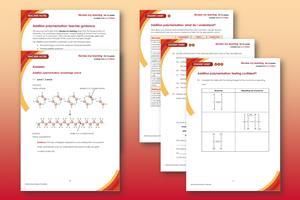Review your learners’ understanding of key ideas, words and phrases relating to addition polymerisation
This resource features three different versions of a worksheet on addition polymerisation: scaffolded, partially scaffolded and unscaffolded. Use the worksheets to identify learners’ knowledge gaps and misconceptions once you have taught this part of the curriculum. Find out more about how to use this resource or download the worksheets below.
-

Download this
Download the scaffolded, partially scaffolded and unscaffolded student worksheets.
You will find model answers in the teacher guidance.
View and download more Review my learning worksheets
Curriculum topics
These worksheets cover the following topics:
- the terminology: monomers, polymers and polymerisation
- forming addition polymers
- naming addition polymers
- repeating units
- writing equations to represent addition polymerisation reactions
- deducing monomers from a repeating unit and vice-versa.
If learners successfully answer questions on these topics, they can attempt the extension question. This gives learners further practice in deducing repeating units from the monomer and vice versa. Learners also draw a diagram to represent a section of the copolymer poly(ethenetetrafluoroethene) given the two monomers.
How to use this resource
The worksheets can be used in a variety of ways:
- to assess learners’ knowledge at the beginning or end of a period of teaching. Match the level of the worksheet to the support needs of the learners;
- to assess knowledge during a period of teaching once learners have completed the relevant topic;
- as part of revision;
- as a refresher exercise for teachers or non-subject specialists.
Scaffolding
Three levels of support, provide options depending on the diverse support needs of learners. An editable version of each worksheet provides further opportunities to adapt the resources to meet individual learning needs. There is also scope to increase the level of the worksheets used, as learners progress through their curriculum.
Independent learning and metacognition
The ‘What do I understand?’ page is common to all worksheets. Learners are encouraged to develop independent learning skills and can use their reflection as a guide for revision. The feedback will also help you to identify areas where a whole class needs attention.
Answers
The teacher guidance provides model answers for all questions, plus guidance on learners’ common misconceptions. Learners can use the model answers to peer or self-assess.
More resources
- Mould your learners’ understanding of polymers with the misconception busters and teaching ideas in this Education in Chemistry CPD article.
- Display the Addition polymerisation poster in your classroom and download the resource to test learners’ knowledge of how addition polymers are structured and named.
- Use the in context and knowledge check worksheets to assess learners on various Organic chemistry topics, including addition polymerisation.
- Learn how polymers are used in wind turbine blade coatings and watch Maria’s video job profile to find out more about green jobs.
- Explore learners’ understanding of monomers, polymers and more with Modelling large molecules from the Outreach resources hub. Use the projects and activities in a sequence of timetabled lessons, science clubs or as part of an activity day.
Downloads
Addition polymerisation scaffolded student worksheet
Handout | PDF, Size 0.47 mbAddition polymerisation partially scaffolded student worksheet
Handout | PDF, Size 0.39 mbAddition polymerisation unscaffolded student worksheet
Handout | PDF, Size 0.35 mbAddition polymerisation teacher guidance and answers
Handout | PDF, Size 0.4 mbAddition polymerisation scaffolded student worksheet
Editable handout | Word, Size 0.53 mbAddition polymerisation partially scaffolded student worksheet
Editable handout | Word, Size 0.45 mbAddition polymerisation unscaffolded student worksheet
Editable handout | Word, Size 0.39 mbAddition polymerisation teacher guidance and answers
Editable handout | Word, Size 0.39 mb


















No comments yet